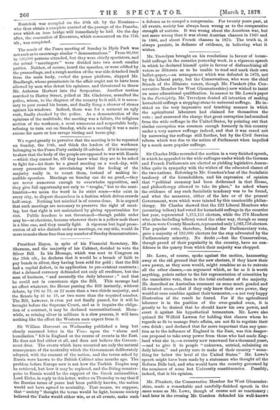Mr. Lowe, of course, spoke against the motion, hammering away
at the old ground that the new electors, if they knew their own power, as they soon would, might combine so as to outvote all the other classes,ŌĆöan argument which, so far as it is worth anything, points rather to the fair representation of minorities by the cumulative vote, than to the total exclusion of the majority. He described an Australian comment on some much goaded and ill-treated oxen,ŌĆöthat if they only knew their own power, they would at once combine against their tormentor,ŌĆöa not very happy illustration of the result he feared. For if the agricultural labourer is in the position of the over-goaded oxen, it is greatly to be desired that he should know his own power, and exert it against his hypothetical tormentors. Mr. Lowe also quizzed Sir Wilfrid Lawson for holding that classes whom he regards as fit to manage State affairs, are not fit to regulate their own drink ; and declared that far more important than any ques- tion as to the influence of England in the East, was this danger- ous proposal to take away power from those who had made Eng- land what she is,ŌĆöa country now renowned for a thousand years, ŌĆöand to give it to people " unknown, untried, subsisting on daily labour," and pretty sure to make of their country " some- thing far below the level of the United States." Mr. Lowe's speech might have been made by a statesman who thought all the Reform Bills bad, and who would have the country governed by the nominees of none but University constituencies. Possibly, indeed, that is his opinion.


































 Previous page
Previous page